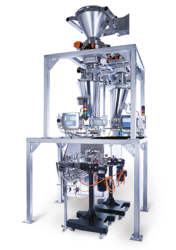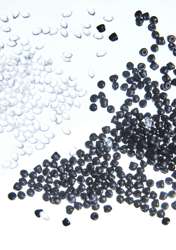When it comes to production, similarities exist among alternative and animal protein processes, but several differences occur, particularly around operational footprint, equipment, and water and energy usage.
Read more: Food Engineering
 Coperion
Open navigation
Coperion
Open navigation
When it comes to production, similarities exist among alternative and animal protein processes, but several differences occur, particularly around operational footprint, equipment, and water and energy usage.
Read more: Food Engineering
Electronic pressure compensation systems are more effective and reliable than traditional mechanical systems.
Loss-in-weight (LIW) feeder performance is dependent on accurate weighing, which can be affected by a variety of influences, both internal and external to the feeder and feeder process. Understanding the significance of these influences is critical for achieving optimal performance, since even slight changes in the mass flow accuracy of a feeder or multiple feeders can make a significant difference in both end-product quality and raw ingredient costs.
Many chemical and pharmaceutical process engineers are challenged by metered dispensing of reactive powders into reactors and large tanks. But dispensing difficult-to-handle ingredients in a contained and accurate method can be fulfilled and completely automated using specifically designed loss-in-weight (LIW) feeders. The combination of highly advanced weighing technology, and a contained and sanitary feeder design provides for an ideal automated method of powder delivery—without the dangers and inefficiencies of traditional manual powder loading techniques.

Currently, there are several new developments in the battery market. Particularly in electrode mass manufacturing where line operators can use various technologies and machines. One option in production is continuous manufacturing using twin screw extruders. Battery-News asked Thorsten Stirner, Team Leader of Process Technology for Chemicals and Battery Applications at Coperion, about the advantages of this process and the requirements for switching over.

Highly filled plastics may offer a suitable solution within the production process for bipolar plates. However, the compounding of conductive additives and the homogeneous mixing of the plastic melt, as well as the accurate prediction of the material behavior, pose a major challenge for polymer engineers. To support the engineering design process of compounding by twin-screw extruders, this present study offers a method to evaluate the achievable mixing quality based on numerical flow simulations.
Read the full article: https://www.mdpi.com/2073-4360/15/12/2589
As demands for sustainable cement production impact on bulk materials handling, more robust and durable valves for cement conveying lines are being developed. These withstand abrasive materials for longer and often provide energy savings in terms of operation.
Manufacturing processes involve a wide variety of raw materials, depending on the industry, and there's an equally wide variety of feeding options available on the market to bring these bulk materials into the process. In applications where free-flowing bulk solids need to be accurately fed to ensure an optimal end-product quality, single screw feeders are often the solution of choice. However, there are a variety of options that can get the job done besides single screw feeders, such as bulk solids pumps, belt feeders, and vibratory feeders. The feeding tool choice is generally based on various application aspects, including the bulk solid material's characteristics, the desired feedrate, hazardous location limitations, the material's flowability, and the space available for installing the equipment.
Established in 1946, Salina, Kansas-based Repco has provided the enrichment industry with ideas, services and products such as flour oxidation and maturing services, vitamin and mineral premixes, micro-ingredient dispensing systems and on-site field servicing. The division of the company that produces vitamin and mineral premix products decided to look into options for modernizing an outdated mechanical transfer system. The decade-old bucket elevator system that transferred the premixes from mixer to packaging was causing housekeeping and segregation issues, not to mention large amounts of product being lost during clean-out. Repco contacted Coperion K-Tron to look into pneumatic conveying solutions that would clean up the process and ensure the finished blended product did not segregate during transfer to the packaging system.
Free-flowing bulk-solids handling can be tricky. You need to ensure a uniform discharge while maintaining the integrity of fragile, friable, abrasive or fibrous materials. Coperion K-Tron has thoughtfully engineered a line of vibratory feeders that achieve high accuracy via patentpending technology. Chemical Processing spoke with Urs Helfenstein, R&D mechanical engineer, Coperion K-Tron, regarding what makes the K3 vibratory feeders different from other feeding technologies.
The dedication of Garrison Brothers Distillery to produce artisanal bourbon in Hye, Texas, has resulted in an increase in popularity, substantial growth and a need to increase production. The distillery prides itself on producing a unique wheated bourbon using the finest locally sourced and organic ingredients, some of which are grown right on the distillery property. Keeping true to that culture, Garrison Brothers expected no less from the system to supply those raw materials to the process.